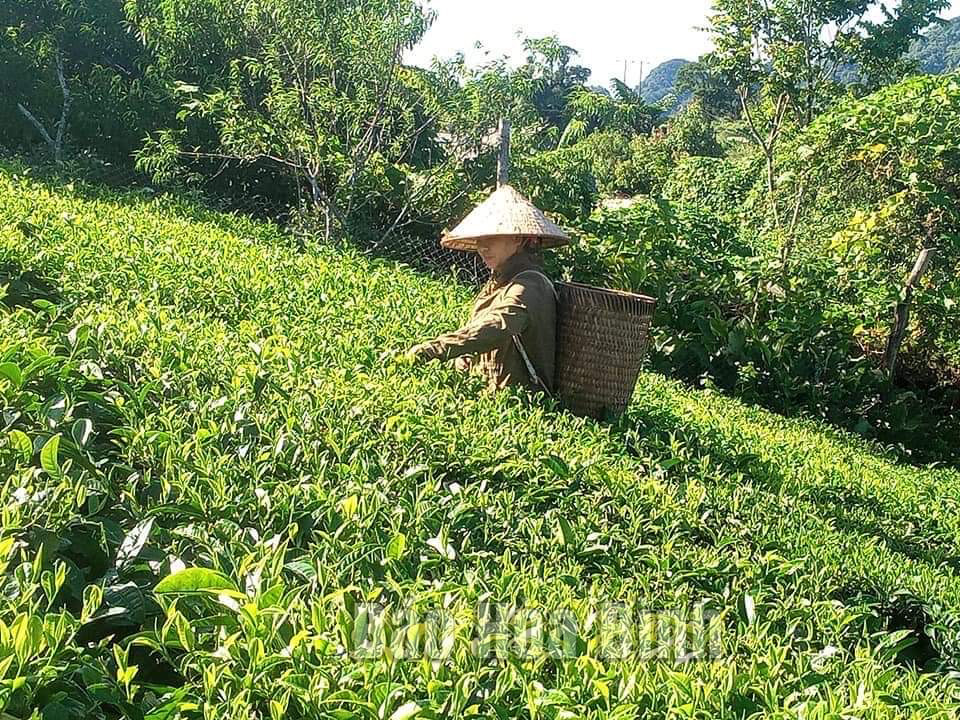
(HBO) - Not only blessed with a cool climate and beautiful landscapes, Pa Co commune in Mai Chau district is also renowned for its centuries-old Shan tuyet tea trees. Local residents have taken efforts to preserve the local unique traditional tea processing method to create a distinctive flavour that cannot be found anywhere else.

![]() Dung Y Thuy’s
family in Cha Day hamlet, Pa Co commune plants nearly 1.5ha of tea trees, which
brings a stable income of 200 -250 million VND (8,500 – 10,600 USD) each year.
Dung Y Thuy’s
family in Cha Day hamlet, Pa Co commune plants nearly 1.5ha of tea trees, which
brings a stable income of 200 -250 million VND (8,500 – 10,600 USD) each year.
Preserving traditional craft
Growing tea trees has been a part of the daily
life and culture of the Mong people in Pa Co for hundreds of years, and the tea
production sector also evolved from that.
The tea production process has become much
simpler with the support of machinery. However, many households in Pa Co still
preserve the traditional manual tea roasting method.
To produce a quality batch of tea, it is
recommended to pick the leaves early in the morning before 10 am and after 3
pm, said Sung Y Thuy in Cha Day hamlet.
Pa Co tea specialty
For a long time, Pa Co dried tea has been
popular in and outside the province, commanding a relatively high price. The
product has helped improve the livelihoods of local tea growers.
Planting tea trees not only brings high economic
value but also contributes to promoting experiential tourism development in the
locality.
Visitors to Pa Co are often amazed at and
delighted to explore ancient tea trees, and experience the traditional tea
production process of the Mong people community.
Nguyen Van Khanh from Hanoi said he is impressed
at the traditional tea production process of Mong people in Pa Co.
Phang A Song, Chairman of the Farmers'
Association in Pa Co commune said the tea roasting process takes a considerable
amount of time.
"It takes 2-3 hours to produce a delicious and
flavourful tea products that embodies the sweet and bitter taste of Pa Co tea”,
he said.
Developing Pa Co tea brand
Pa Co commune is home to 82ha of tea, including
over 200 ancient Shan tuyet tea trees. Thanks to the natural care process, the
ancient trees generate good-quality products, bringing high income to local
farmers.
Hoa Binh province is undergoing a dynamic transformation amid Vietnam’s national digital transition. Building on Poliburo’s Resolution No. 57-NQ/TW on breakthroughs in science, technology, innovation, and national digital transformation, the province has rolled out a wide range of practical action plans. A standout initiative is the "Digital Literacy for All” movement, an effort to ensure that no one is left behind in the digital era.
Hoa Binh province is undergoing a dynamic transformation in the wake of the national digital transformation movement. Building on Resolution No. 57-NQ/TW of the Politburo on breakthroughs in science, technology, innovation, and national digital transformation, the province has implemented a wide range of practical action plans. A standout initiative is the "Digital Literacy for All” movement ambitious effort to ensure that no one is left behind in the digital age.
With a spirit of unity and proactive problem-solving, the Party Committee, the government and the people of Dong Lai Commune (Tan Lac District) have made great strides in implementing the resolutions of the 24th Party Congress of the commune for the 2020 - 2025 term. Focusing on leadership and practical actions, the commune has brought the Party’s resolutions into daily life, creating strong impacts and pushing the local development forward.
Amid the nationwide push for digital transformation, young people in Hoa Binh Province are stepping up as dynamic pioneers, applying technology to enhance Youth Union operations and expand the reach of youth-led initiatives. Through creativity and adaptability, Youth Union organizations at all levels have introduced a series of practical solutions, contributing to modern governance and community development.
In recent years, An Nghia commune, located in Lac Son district, has stepped up administrative reform, focusing on improving the quality and efficiency of its single-window service unit for receiving and processing administrative procedures. These improvements have helped create favourable conditions for local residents and organisations to handle administrative procedures, contributing to the commune’s broader socio-economic development.
The Prime Minister-approved master plan to develop the multi-use value of forests ecosystems through 2030, with a vision to 2050, aims to improve the management and sustainable use of forest resources, create jobs, increase incomes, and improve the living standards of ethnic minorities, people in mountainous and remote areas, forest workers and those living near forests.



